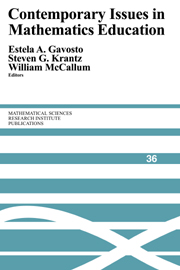Book contents
Beyond the Math Wars
Published online by Cambridge University Press: 27 June 2025
Summary
Introduction
Mathematics education is in ferment. Perhaps it always is, but disagreements have become louder; these quarrels have not only captured the general public's attention, but have been exacerbated by articles and opinion columns in the mass media. Almost nothing is considered beyond question, and many people have decided that they are in a “war” in which they need to take sides.
Wars are notable largely for the destruction they wreak. Occasionally they are unavoidable, but there are usually better ways to decide things. This particular war is a war only in the minds of those who wage it, and the supposed sides have more in common with each other than they think. Furthermore, many of the charges made against, or the descriptions of, one supposed side or the other are false.
The purpose of this paper is to puncture some of the myths lying behind the notion that there is a war going on, and to point to areas of broad agreement. Sometimes the agreement is only that a particular issue is an important one, but that is a place to start. Usually the agreement is much deeper.
At the suggestion of the editors, a glossary is provided at the end to describe some of the more technical terms in education. Misunderstanding of what these terms mean is one reason for the notion that war is necessary. Terms in the glossary are in boldface in their first appearance in the text.
Information
- Type
- Chapter
- Information
- Contemporary Issues in Mathematics Education , pp. 123 - 134Publisher: Cambridge University PressPrint publication year: 1999
